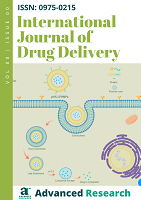Preformulation studies a view to develop fast release solid dosage form
Keywords:
Rofecoxib, Polyethylene glycol 6000, solid dispersions, FTIR, solvent methodAbstract
The purpose of the present investigation was to increase the solubility and dissolution rate of rofecoxib by the preparation of its solid dispersion using Polyethylene glycol 6000 as a hydrophilic carrier in different proportion ranging from 1:2 to 1:12 using solvent evaporation method. Drug polymer interactions were investigated using Fourier transform infrared spectroscopy (FTIR). The solid dispersions prepared were subjected to assay, solubility and in vitro dissolution studies. The obtained results showed that the solubility was increased 5 fold over that of pure rofecoxib with 1:10 ratio of carrier and the dissolution rate considerably enhanced. The drug-to-carrier ratio was the controlling factor for dissolution improvement with maximum dissolution observed with 1:10 solid dispersion. This increase in the dissolution rate was due to improved wettability by the carrier. At higher level (after 1:10 ratio), the negative effect on dissolution appears that may be due to distortion of molecular dispersion structure, which leaves an insoluble drug particle and increased accumulation of carrier molecule in the bulk, to cause a saturation, by which further solubility of rofecoxib is retarded. FTIR spectra revealed no chemical incompatibility between the drug and PEG6000. The optimized 1:10 (RXB: PEG6000) solid dispersion was used in the formulation of tablet using microcrystalline cellulose as superdisintegant by direct compression. The Flowability and compressibility of the blend was found to be fair for compression. The tablet weight was maintained at nearly 180mg.
References
Whelton A, et al, cyclo-oxygenase-2-specific
inhibitors, Amer.j.Ther, 2001,8:85-95.
Goodman and Gilman’s, Eds., In; The
Pharmacological basis of therapeutics, 10th
edition, McGraw Hill, 2001, 714-715.
Reynolds, J.E.F., In; Martindale, the Extra
Pharmacopoeia 33rd Edn., The Pharmaceutical
press, London,2002,81.
Susan Budavari, Eds, In, The Merck Index,13th
Ed., Merck &Co., Inc., Whitestation, NJ, 2001,
, 1691.
Chiou WL, Riegelman S. Pharmaceutical
applications of solid dispersions. J Pharm Sci.
;60:1281.
Kerc J, Mohar M, Srcic S, Kofler B and Smid
Korbar J Dissolution Study of Felodipine Solid
Dispersions. Acta Pharm., 1993, 43 (2): 113-120.
Van den Mooter G, Wuyts M, Blaton N, et al.
Physical stabilisation of amorphous ketoconazole
in solid dispersions with polyvinylpyrrolidone
K25. Eur J Pharm Sci. 2001;12:261.
Esnaashari S, Javadzadeh Y, Batchelor HK,
Conway BR. The use of microviscometry to study
polymer dissolution from solid dispersion drug
delivery systems. Int J Pharm. 2005;292:227.
Van den Mooter G, Augustijns P, Blaton N,
Kinget R. Physico-chemical characterization of
solid dispersions of temazepam with polyethylene
glycol 6000 and PVP K30. Int J Pharm. 1998;
:67.
Masaki K. Orally disintegrating famotidine
tablets. 22nd Conference on Pharmaceutical
Technology; July 15-17, 1997; Kisarazu, Japan.
Tokyo, Japan: Academy of Pharmaceutical
Science and Technology; 1997:79.
Corveleyn S, Remon JP. Formulation and
production of rapidly disintegrating tablets by
lyophilization using hydrochlorothiazide as a
model drug. Int J Pharm. 1997;152:215.
Higuchi T, Connors KA. Phase-solubility
techniques. Adv Anal Chem Instrum. 1965;4:117.
Franco M, Trapani G, Latrofa A, et al.
Dissolution properties and anticonvulsant activity
of phenytoin-polyethylene glycol 6000 andpolyvinylpyrrolidone K-30 solid dispersions. Int J
Pharm. 2001; 225:63.
Arias MJ, Gins JM, Moyano JR, Rabasco AM.
Influence of the preparation method of solid
dispersions on their dissolution rate: study of
triamterene-D-mannitol system. Int J Pharm.
;123:25.
Sethia S, Squillante E. Solid dispersion of
carbamazepine in PVP K30 by conventional
solvent evaporation and supercritical methods. Int
J Pharm. 2004;272:1Y10.
Abdul-Fattah AM, Bhargava HN. Preparation and
in vitro evaluation of solid dispersions of
halofantrine. Int J Pharm. 2002;235: 17.
Torrado S, Torrado J, Cadorniga R. Preparation,
dissolution and characterization of albendazole
solid dispersions. Int J Pharm. 1996;140:247.
Torre P, Torrado S, Santiago T. Preparation,
dissolution and characterization of praziquantel
solid dispersions. Chem Pharm Bull (Tokyo).
; 47: 1629
Banker GS, Anderson NR. In; Lachman, L,
Lieberman, HA, Kanig, JL, Eds., The Theory and
Practice of Industrial Pharmacy, 3rd Edn., Lea
and Febiger, Philadelphia; 1991, p 293.
Goodhart FW, Draper JR, Dancz D, Ninger FC.
Evaluation of tablet breaking strength testers. J
Pharm Sci 1973; 62(2): 297-304.






